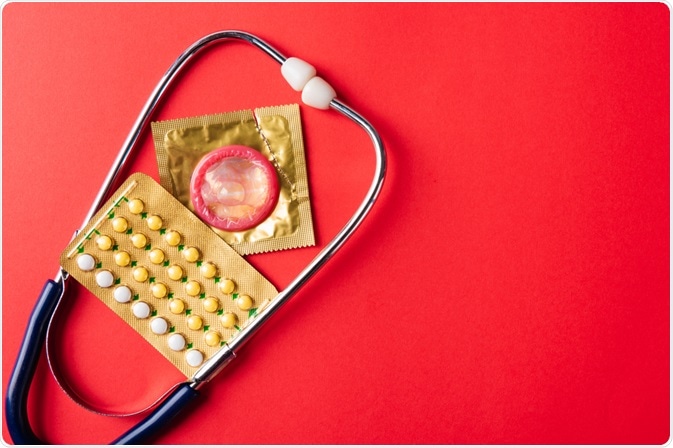For something as ubiquitous as sex is – almost everyone reading this has come into the world because of it – there is a lot of secrecy shrouding it. Some myths surrounding this topic seem to be both ageless and persistent, despite the free availability of information about it.

Image Credit: Sorapop Udomsri/Shutterstock.com
How not to get pregnant
For example, many people still believe that if a girl is on oral contraceptives ("the pill"), she and her partner won't get sexually transmitted infections (STIs). This is wrong. The pill may protect against pregnancy, for the most part, but a condom is also necessary if STIs are to be averted.
Note that withdrawing the male organ before ejaculation occurs is not a foolproof way of preventing pregnancy, neither will it prevent STIs, which depend on the amount of skin-to-skin contact and not just on contact with the sperm.
If a single condom offers a high degree of protection against STIs and pregnancy, two should be better, right? Again, no, because two condoms are often more difficult to apply properly, and the extra friction between them may actually promote condom breakage and increase the odds of unintended pregnancy.
And it's not a good idea to store condoms in cars, wallets, and so on. These devices are made of a material that breaks down on exposure to heat and friction. The suggested storage is in cool places, such as the drawers in your bedroom.
Again, if a condom is worn improperly the first time, and has to be put on again for correct use, the original condom should be discarded, as semen may well have come into contact with the surface next to the skin, which is now on the outside, ready to make contact with the vagina.
Also, showering or douching after having sex does not prevent pregnancy. It is far preferable to use a contraceptive. Even with contraceptives such as the pill, protection kicks in only after about a week of taking the drug. During this period, therefore, a condom should be used as a backup.
If a girl and a boy sit close, kiss, hug or even get into a clutch with their clothes on, pregnancy will not result, since this requires that sperms in the semen reach the uterus to fertilize an ovum within the fallopian tubes opening off this organ.
Conversely, if semen is ejaculated just outside the vagina, and if the vaginal area is moist, sperms can swim up through the vagina to cause pregnancy.
It doesn't necessarily take more than one act of vaginal intercourse to get pregnant, and no sex position protects against pregnancy. For instance, sex in a pool or a bath, or while standing up, is still sex, and as long as sperms are introduced into or very near the vagina, pregnancy may result, and STIs can certainly be transmitted.
Having sex during a menstrual period can also lead to pregnancy, but if a period occurs soon after the sexual act, pregnancy is unlikely.
Transmission of STIs
Vaginal sex is not the only type of sexual activity that can cause STIs to be transmitted, so condoms should be freshly used with each new sexual act. In fact, the anal mucosa is singularly ill-suited for sexual acts, being thin and easily damaged, accounting for the rapid entry of STI pathogens following anal sex.
The human immunodeficiency virus (HIV) used to be among the most feared STIs until very recently. Yet many people still believe that only homosexual men get this infection. The truth is that anyone can contract HIV via unprotected sexual contact with a partner who has HIV unless pre-exposure prophylaxis is taken.
At the same time, HIV is known to be transmitted only through sexual fluids (semen and vaginal fluid), blood, and breast milk, while urine, saliva, and tears do not contain the virus. However, if the male organ comes into contact with cuts and nicks caused by shaving, for example, or infected hair follicles, HIV can be transmitted through the blood or blood exudate at these sites.
Many also believe that it's always obvious if one has an STI, and are therefore willing to take risks such as unprotected sex with an apparently healthy partner. The fact is that up to half of all sexually active young people have an STI at some point, and many may not develop symptoms. Yet they can transmit the infection just the same. The only foolproof way, or the safe way, to prevent getting and spreading an STI, is to have an annual sexual health examination to rule out the presence of such infections.
Since oral sex does not cause pregnancy, is it safe? The answer is that oral sex, just like any other type of sex, can allow STIs to be transmitted, although it certainly does not allow pregnancy to occur.

Image Credit: Jarun Ontakrai/Shutterstock.com
Useful sex education
Talking to children about sex in an understandable and sensitive way usually helps them understand the rudiments of how it works and the problems that may occur if they have sex without the proper setting. Moreover, many holistic school sex education programs also explain the value of abstinence as a measure to prevent having to deal with sex-related complications before the child is ready.
Knowing that abstinence is a valid and widely practiced option often relieves the pressure on children to have sex just to keep up with their peers. And being informed about sex helps them make their own good choices, rather than rush ahead for thrills and getting into trouble that they cannot handle.
Young people should also know that the excitement of watching pornography is deceptive, because sex in real life is typically not like porn, nor do ordinary people look like porn stars. Moreover, pornography is addictive and may prevent people from feeling satisfied with their perfectly good sex lives.
It is a clear and unmet need for healthcare providers to answer young people honestly and kindly, to tell them about the risks of having sex before entering a lifetime relationship, and to dispel misconceptions that continue to linger about the acts of intercourse and contraception.
References
- Health.qld.gov.au (2020). Sexual health: myths vs truths. https://www.health.qld.gov.au/
- Bcm.edu (2020). Sexual health myths. https://www.bcm.edu/community/healthcare-outreach/teen-health-clinic/teen-health-clinic-services/sti-screening-treatment/sexual-health-myths
- Sph.uth.edu (2014). Sexual Health Education Common Myths. https://sph.uth.edu/campuses/houston
- Healthforteens.co.uk (2020). 10 mega myths about sex. https://www.healthforteens.co.uk/sexual-health/are-you-ready-for-sex/10-mega-myths-about-sex/
Further Reading
Last Updated: Jul 1, 2023